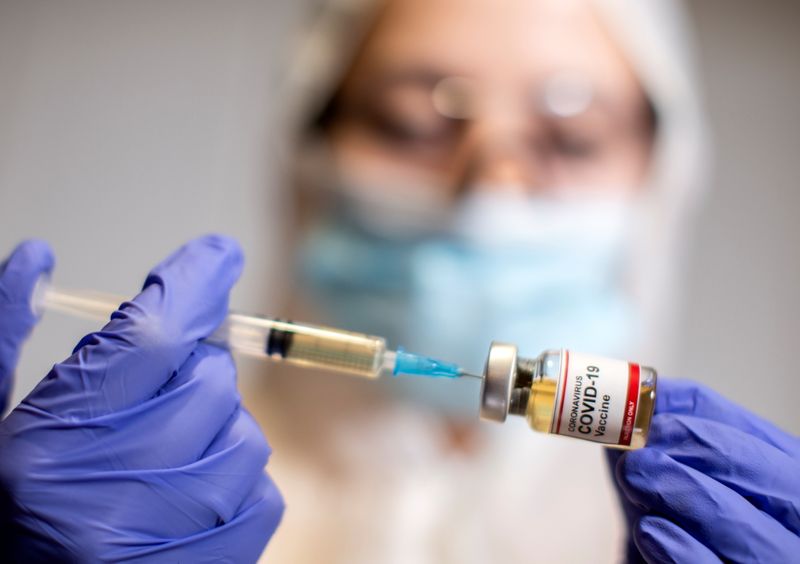By Tom Westbrook and Elizabeth Howcroft
SYDNEY/LONDON (Reuters) - Investors expecting an imminent COVID-19 vaccine are beginning to buy bank stocks and industrials in anticipation of a roaring return in consumer confidence, though many remain wary of risks in sectors ravaged by the pandemic.
The development of some kind of preventative medicine is seen as the best chance of halting the coronavirus, which has killed 1.2 million people and is the top issue for money managers eyeing the next major shift in financial markets.
As the market hype around the U.S. election ebbs, investors are now preparing for good vaccine news, which they believe is a matter of when, not if.
"It's going to be absolutely massive," said Stuart Oakley, head of cash currency trading at Nomura in London. "If we get a vaccine, we're going to see all that pent up demand coming out."
Of the roughly 45 vaccines undergoing human trials, those from Pfizer (N:PFE) and Moderna (O:MRNA) are seen as possibly winning regulatory approval this year, with AstraZeneca (L:AZN) not far behind.
Investors are looking beyond an expected "excitement rally" and at longer-term beneficiaries and short-selling opportunities.
"What we've done is given ourselves some optionality for a recovery trade, or a vaccine trade, by having some exposure to financials," said Binay Chandgothia, a Hong Kong-based portfolio manager at Principal Global Investors.
Banks benefit from increased economic activity and would be helped if bond yields rose, he said, adding he had increased exposure to growth-sensitive small companies and would buy stocks in Singapore and Hong Kong if trade and travel pick up.
Brian Jacobsen, senior investment strategist at Wells Fargo (NYSE:WFC) Asset Management in Wisconsin, said industrials offered broad exposure to a rebound in confidence in areas from building products to aviation.
Deutsche Bank (DE:DBKGn) manages a "vaccine basket" of Singapore dollars and Thai baht, seen benefitting from increased trade and tourism, against the Philippine peso, which is weighed by rising imports.
Financials <.dMIWO0FN00PUS> and industrials (MIWO0IN00PUS) have gained with the broader market this month, but badly lag a roughly 5% gain in world stocks (MIWO00000PUS) this year. The baht has also surged recently against the peso (PHPTHB=R).
THREAD THE NEEDLE
Investors are also setting up short positions.
Shinji Naito at Japan's SPARX Asset Management, which has $12 billion under management, hopes a vaccine could trigger a payoff from shorts in stocks pumped up by the pandemic, such as some technology firms, while helping long investments such as realtor Tokyo Tatemono (T:8804).
Dave Wang, a portfolio manager at Nuvest Capital in Singapore, said long-short pairs could wring gains from what is likely to be an uneven recovery.
For example, airports, which charge per aircraft regardless of their loads, could perform better than airlines hit by low patronage and rising fuel costs.
Of course, not everyone is scrambling for a piece of the action amid questions about the timing, efficacy and distribution of any vaccine still remaining.
"You're better off being a bit too late than too early," said Hugh Dive, chief investment officer at Atlas (NYSE:ATCO) Funds Management in Sydney, noting delays would leave under-pressure companies needing to raise more money quickly.
Others, however, feel it is now safe to bet on a global rebound, which a vaccine would boost.

"I think there's two different trades," said Sean Taylor, chief investment officer in Asia for German fund manager DWS. "A vaccine trade and a cyclical trade. I'm more positioning in cyclicals," he said. "If we got much more credible data for vaccines, then I'd add services."